Marijuana Regulation Is Largely an Illusion in Denver Too, but So What?

The Justice Department's crackdown on medical marijuana has been notably less heavy-handed in Colorado than in other states. While the feds have shut down hundreds of dispensaries in California and continue to target businesses that supply cannabis to patients in Washington, John Walsh, the U.S. attorney for Colorado, has contented himself with sending threatening letters to 50 or so medical marijuana centers he deemed too close to schools. Hundreds of others continue to operate, unthreatened, unraided, and unseized. The usual explanation for this striking difference can be summed up in one word: regulation. While neither California nor Washington explicitly allows dispensaries, which operate in a legal gray area unregulated by the state, since 2010 Colorado has licensed them, laying out specific, picayune, and often cumbersome rules for their operation. But as a state audit released last March showed, Colorado's vaunted regulatory system is largely an illusion, strict in theory but unenforced in practice. A recent audit of marijuana oversight in Denver, which is home to more cannabis operations than the rest of the state combined and was regulating the industry before the state did, found something similar.
According to the report, which was released last week by Denver Auditor Dennis Gallagher, the city's Department of Excise and Licenses "does not have a basic control framework in place for effective governance of the City's medical marijuana program." Here are the audit's highlights:
1. The City's medical marijuana records and data are incomplete, inaccurate, and at times inaccessible.
2. The Department lacks formal policies and procedures to govern the medical marijuana business licensure process.
3. The coordination between the City and the state for dual medical marijuana licensure has been poor.
4. Deadlines are either not established or not enforced for key steps in the medical marijuana licensure process.
5. The medical marijuana licensure process lacks management oversight, adequate staffing, and proper segregation of duties.
6. The medical marijuana licensure fee was established arbitrarily.
7. Key information has not been kept up-to-date as medical marijuana policies have evolved.
The Department's lack of follow-up on license applications, and in conjunction with State law, has allowed some medical marijuana businesses to operate in the City without a valid City license. Further, the Department does not know how many medical marijuana businesses are operating in Denver. Since recreational marijuana will be legal in the state effective January 2014 as a result of Amendment 64, it is critical that the City develop and implement a robust system for regulating marijuana-related businesses before the current problems are exacerbated by a new surge of recreational marijuana license applications.
Opponents of legalization have latched onto the audit as further evidence that approving Amendment 64 was a huge mistake and that implementing it will be a disaster. But to me the real lesson here is that Colorado seems to be doing OK despite more than a decade of tolerating a legal marijuana industry, an industry that was officially unregulated for most of that time and to a large extent remains unregulated in practice. NORML's Paul Armentano makes this point in a recent interview with The Verge (even while regretting that the government so far has not delivered the regulation it promised). "We've been told that the reason we can't change [marijuana policy] is because if we do, the sky will fall," Armentano says. "The sky is not falling in Colorado. People that live in Colorado recognize that, and people outside of Colorado will recognize that as well."
[Thanks to Richard Cowan for the tip.]


Show Comments (20)